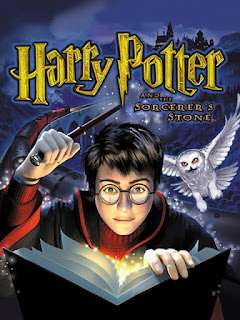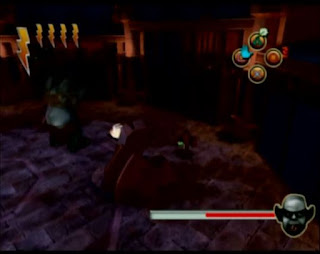Everyone can probably agree that the first Harry Potter novel was more of a trial and error novel where JK Rowling was trying to find her footing in the genre and the world she was building. The story and the lore she was building was in its infancy and it took a few more novels to really grow what she wanted from the series itself. This game is a release on the PS2, given much better graphics and more fluid mechanics in comparison to its Playstation 1 counterpart. The first iteration of the Philosopher's stone (which it is properly titled) was more of a puzzle platformer and that's a lot of what we got here, but it has more development behind it.
Keep this in mind, because there are still some rough areas in this game where there should have been a bit more thought. The mechanics have a good amount of thought when it comes to figuring out and exploring the world and the puzzles. When you play through the levels, you can look in different areas around where you're supposed to be puzzling to find extra items and even some collectibles. Instead of moving a huge cube into its place for the puzzle right away, you can push it to a shorter wall in order to jump on top of that wall to get some health power ups or even some chocolate frog cards.
The collectibles are probably the best part of this while also being one of the more annoying aspects. Yes, it's nice to have the chocolate frog cards, but do we really need to go straight into their history and/or text as soon as we collect them? The Berttie Bot's Beans are fun to collect as well, but do we need to know every single flavor your pick up as well as your reaction to said flavors? You pick them up and Harry will tell you what he thinks of them right away individually and there really aren't that many flavors to choose from. They're not only collectibles, but they're also the currency for which you pay for dung bombs and other useful items.
This iteration of the game has its good points, like when you cast spells on imps in order to trap them in cages while also figuring out puzzles. However, the problem it has is with the extra mechanics that it adds to the game. The stealth in this game are rough to say the least. When you have to get around Percy Weasley to get to the Weasley item shop in a secret passage through the Gryffindor Dorms. Not that they could have done it in their own dorms, they had to do it in the Prefect Dorms! Whatever sense that makes is not important, I guess, but getting through this stealth section is not a matter of skill, it's a matter of luck because Percy will go anywhere and everywhere in this place and it's so easy for him to catch you.
One part of the game that should have been better explained was the section where you catch Draco Malfoy on his broomstick. You're supposed to cut corners and catch him, and if you didn't know this beforehand, the game will not tell you anything. You can just keep chasing him and chasing him and chasing him and you'll seem like you're getting closer just like this but you never do. You have to maneuver around him as much as possible in order to catch him off guard. This is monotonous to say the least, because the game WILL NOT progress until you do and it's just a matter of figuring it out yourself. Once you figure out the mechanic, it's really not hard and you can ace it in no time, but the game really should be telling you these details.
The levels have the problem of being too open and the game has a horrible habit of not telling you a single thing to do. The stage where you're supposed to find the potion ingredients in Hagrid's Hut leaves you to figure out everything for yourself. There's some things that you can figure out on your own, but really not a whole lot. Figuring out where to go and how to collect the plants is left up to luck because you just need to know how to approach everything and the luck of having to dodge the gnomes that gain in number the longer you're there. These sections can be especially long and boring while you're sitting there trying to determine where to go and what plants you need to collect.
The glitches are also on full display here. You can do parts of the Hagrid's Hut level by simply climbing one of the roots and getting behind the waterfall without the platforms and having no need to activate the gargoyle behind the bars. I also had a part of one level where I searched one of the boxes, but nothing happened. I got stuck in the box and was forced to load my last save. These glitches aren't horrible and they're not especially bad, but there are just so many time wasting elements in this game. The game sometimes doesn't outright tell you when you finish a mission and so you're going around the level to try and find anything else you can do until you figure out that you can check your book and it will tell you there.
The openness in this game is a strength as well as its most glaring weakness. Sometimes, it is alright to tell us where to go or tell us when a mission is done. On the other hand, though, before you do anything in your actual missions, you can search Hogwarts to get more beans and pumpkin pasties. The more health items you get while you're at full health, the more health meters you get. It's fun to explore Hogwarts, but it's not so fun when you don't know which doors to go through and searching for ways to go can become stale and overly time consuming.
Overall, the game is a mixed bag, but it's a decent Harry Potter game. Like Berttie Bott's beans, there are good and bad elements to it and honestly, exploring the school can be a little more fun than simply going through the story mode itself. The graphics and gameplay are far better than the original PS1 iteration of Philosopher's Stone, but it also has a few elements that deserve a bit more explanation. It's a title worth checking out if you're a fan, but remember not to spend too much money on this. Save your Virtua Galleons.
















